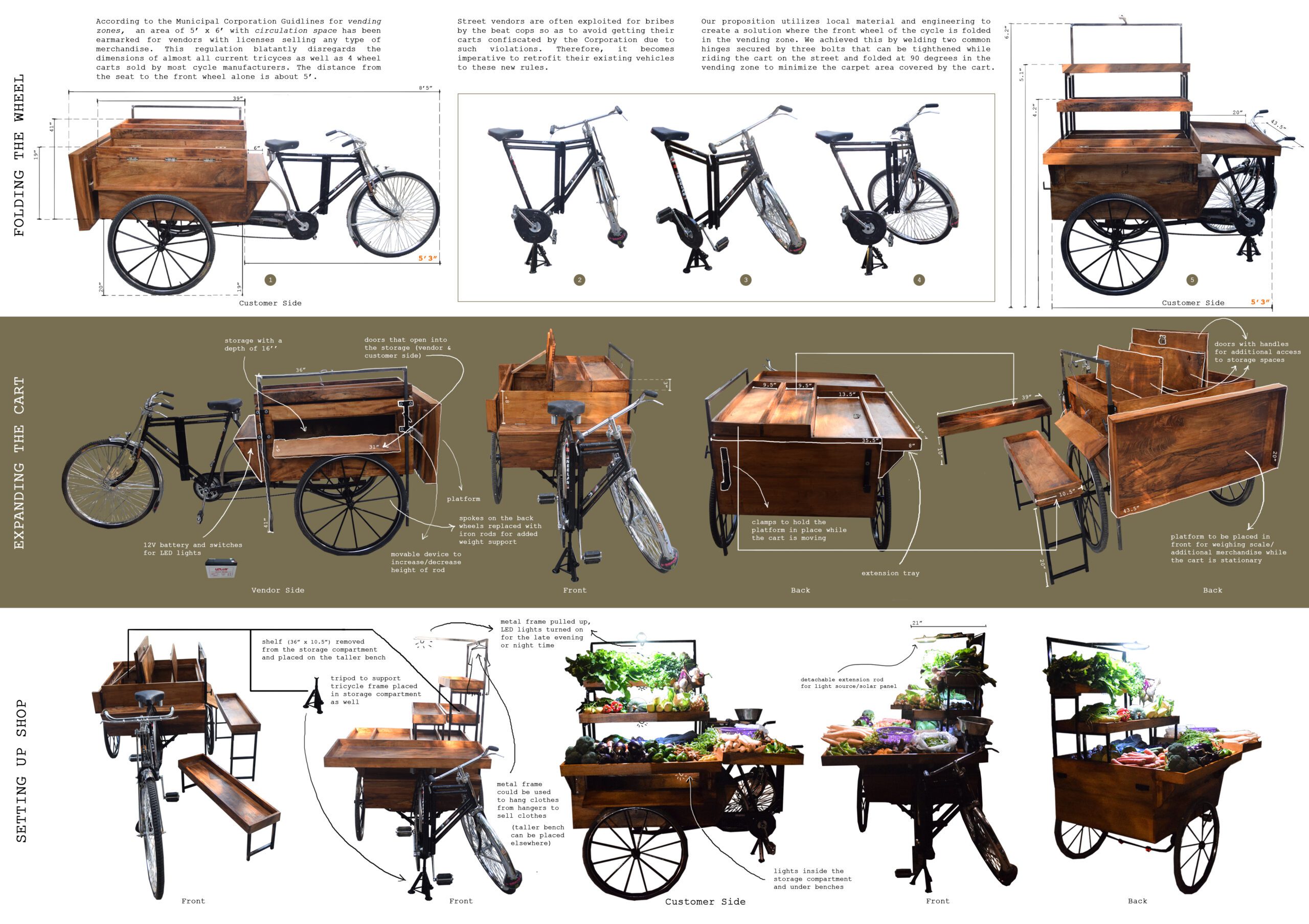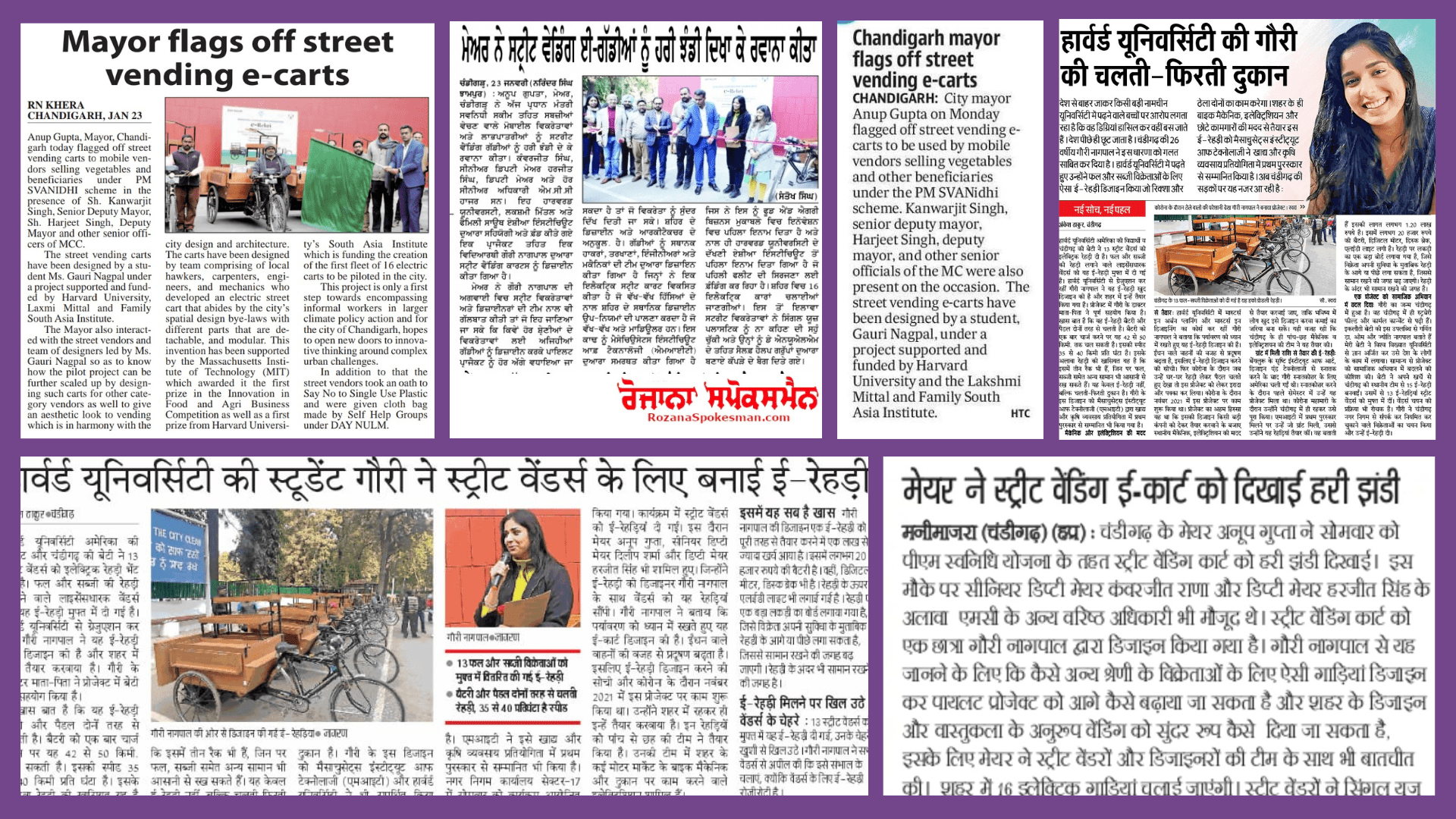Looking back at the journey of the Seed for Change competition 2022 winner project, e-Rehri, exemplifies how bold ideas can create lasting impact. Born from a vision to support informal vendors in Chandigarh, India, this initiative has grown into a transformative solution for mobility, sustainability, and livelihoods. From its first prototype addressing lockdown challenges to the deployment of an electrified fleet, e-Rehri has become a testament to innovation driven by community needs.
The e-Rehri project team consists of founder Gauri Nagpal, who graduated from Harvard Graduate School of Design in 2023 and is currently a doctoral candidate in City and Regional Planning at Cornell University, along with O.P. Nagpal, Jyoti Nagpal, Irshaad Ahmed, Shiv Kumar, Parveen Kumar, Amarjeet Singh Kochar, Balkar Singh Babby, and Mohammed Amjad.
Are you a Harvard student and interested in applying for a Seed for Change grant to fund your bold, creative idea that has the potential for widespread impact in India? Apply by February 7, 2025.
From Seed to Change
The e-Rehri initiative, founded by Gauri Nagpal, Harvard Graduate School of Design ’23, and launched during the stringent 2020 lockdown, stands as a beacon of hope for informal vendors in Chandigarh, India, whose mobility is integral to their livelihood. Facing urban restrictions that demanded rehris (carts) fit within a strict 5ft x 6ft area, the project sought innovative solutions to ensure compliance while improving functionality.
The initiative, rooted in extensive fieldwork and collaboration with over 40 vendors, local artisans, and mechanics, created a vehicle tailored to real-world needs. These e-Rehris not only meet legal requirements but also integrate electric vehicle (EV) technology to reduce physical strain and enhance sustainability. To make them accessible, the design emphasized affordability, using locally sourced materials and tiered upgrades, ensuring even small investments yielded significant benefits.
“Using local materials within a 20-kilometer radius and involving local craftsmen, the e-Rehri prioritizes adaptability, sustainability, and financial feasibility for vendors.” – Gauri Nagpal

A rendering of the original design plans
Scaling the Vision
In 2022, the Seed for Change grant provided the means to expand this project. A pilot program, featuring a fleet of 16 vehicles, was officially launched by Chandigarh’s mayor in January 2023. These vehicles were even showcased at the G20 summit, a testament to their relevance. The backing of city authorities brought much-needed security to rehriwallas (street vendors), safeguarding their livelihoods under the Street Vending Act of 2014.

e-Rehri carts line up to start the day
The project’s philosophy of adaptability has proven transformative. It was never intended as a fixed design to be marketed but as a solution adaptable by the community. This approach has sparked creativity and economic opportunities, with multiple variations of the e-Rehri now seen across the city. Local stakeholders have embraced the design, modifying it to meet diverse needs and fueling innovation in informal economies.

A selection of media coverage of the launch
Overcoming Challenges
Despite its success, the initiative faced hurdles in securing sustainable municipal funding. Financial constraints within the city have limited the project’s scalability. To address this, the team is exploring alternative funding models, such as carbon financing. Inspired by successful implementations like the Delhi Metro’s use of carbon credits, the project aims to create revenue streams for climate-aligned interventions that also prioritize livelihoods.
Transformative Impact
The e-Rehri project has profoundly impacted its users. Vendors report improved mobility, reduced physical strain, and enhanced earning potential. One vendor notably shared that the e-Rehri had “added ten more years” to their life—a powerful acknowledgment of the initiative’s human and environmental impact. By aligning clean energy solutions with sustainable development, the project addresses dual goals: improving livelihoods and advancing climate action in the Global South.

Looking Ahead
The future of e-Rehri lies in innovation and scaling. Plans to integrate carbon financing aim to address fiscal challenges while expanding the initiative’s reach. This approach aligns with broader municipal priorities, offering scalable solutions to urban challenges.
By merging technology, community-driven design, and sustainable practices, the e-Rehri project represents a model for inclusive urban development. Its success underscores the importance of collaborative efforts in creating equitable cities that prioritize the needs of all stakeholders, especially those at the margins. The project’s success was also recently featured in an MIT Press book titled ‘Interrogative Design‘, that was launched at a symposium on December 5, 2024, at the MIT Press bookstore.
Join the Next Wave of Innovation
The e-Rehri journey showcases the power of ideas supported by the Seed for Change competition. Are you a Harvard student who is ready to make a difference? Apply for the Seed for Change Competition and turn your bold vision into reality, shaping a sustainable and inclusive future.
